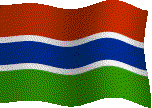…asked
to address deficiencies to avoid blacklist
 |
| Besides money laundering and terrorism-financing threats, there is
still a high perception of public corruption in The Gambia, according to reports. |
The
Gambia has been called upon to demonstrate greater commitment to the
implementation of its Anti-Money Laundering and Counter-financing Terrorism,
AML/CFT, measures, a report by a West African agency that monitors and works to
prevent the twin crimes has stated.
The call
was made at a November 2013 Plenary session of the Inter-Governmental Action
Group Against Money Laundering in West Africa, GIABA.
Progress
in the implementation of AML/CFT measures in The Gambia has been slow,
according to GIABA’s 2013 Annual Report published
in August 2014. It stated that the country also lacks the capacity to monitor the
full stretch of its borders – with regards to the fight against money
laundering.
“The
country was directed to address its AML/CFT ‘strategic deficiencies’ and submit
a follow-up report in May 2014, failing which a public statement will be
published on the country.
“These
serious measures have been taken by the Plenary because of the high risk
associated with the country’s low compliance level,” the report revealed.
GIABA
said The Gambia needs to mobilize all required resources, including political
commitment at the highest level, in order to mitigate the money laundering and
terrorism financing risks it faces.
“It is
also in the interest of the country to address these deficiencies urgently in
order to avoid being blacklisted as a country not making sufficient progress to
improve its AML/CFT system,” GIABA warned. “The consequences of this action on
the country’s economy will be enormous.”
The report indicated that the main obstacles to implementation of AML/CFT
measures in the West African country are
“weak law enforcement” and the “low capacity” of regulatory authorities.
“The low level of reporting and the lack of
prosecution and conviction in the face of real ML/TF threats are matters of
concern,” the report stated.
In April 2014, GIABA director general
Adama Coulibaly, advised The Gambia to “quickly finalise” its national AML/CFT strategy.
The strategy is to serve as a
driving force for deepening Gambia’s AML/CFT system, government officials said.
Coulibaly said the relevant action plans need to be
developed as quickly as possible to enable the full implementation of the
strategy.
“It is equally important for The Gambia to adequately monitor
and evaluate mechanisms to ensure full accountability,”
added Coulibaly.
Mama Fatima Singhateh, Minister of Justice,
said the predicate crimes [offences that lead to] of money laundering have been
criminalised in The Gambia’s criminal code and other legislations.
In 2012,
The Gambia enacted a new AML/CFT law, reactivated the Inter-Ministerial Committee
and appointed a Director for its financial intelligence unit, the FIU. GIABA
said these measures have helped to address some of the deficiencies in the
country’s AML/CFT regime.
However,
it added that the seventh follow-up report of the country, submitted in
November 2013, shows that it has not addressed a number of the “strategic
deficiencies” in its AML/CFT system.
The most
crucial of these deficiencies are the non-criminalisation of the full range of
predicate offences, absence of effective laws and procedures for implementing
UN Security Council Resolutions 1267 and 1373, and lack of ratification of
various instruments on counter-terrorism.
In
particular, the country has not ratified the key UN International Convention on
the Suppression of the Financing of Terrorism.
Besides money laundering and terrorism-financing threats, there is
still a high perception of public corruption in The Gambia.
Transparency International’s 2013 Corruption Perception Index, CPI,
gave the country a score of 28% with a global ranking of 127 out of 175
countries. The Gambia’s CPI ranking represents a decline from its 105 position
out of 174 countries and a score of 34% in 2012.
Written by Modou S. Joof
Follow on Facebook: The North Bank Evening Standard
No comments:
Post a Comment
The views expressed in this section are the authors' own. It does not represent The North Bank Evening Standard (TNBES)'s editorial policy. Also, TNBES is not responsible for content on external links.